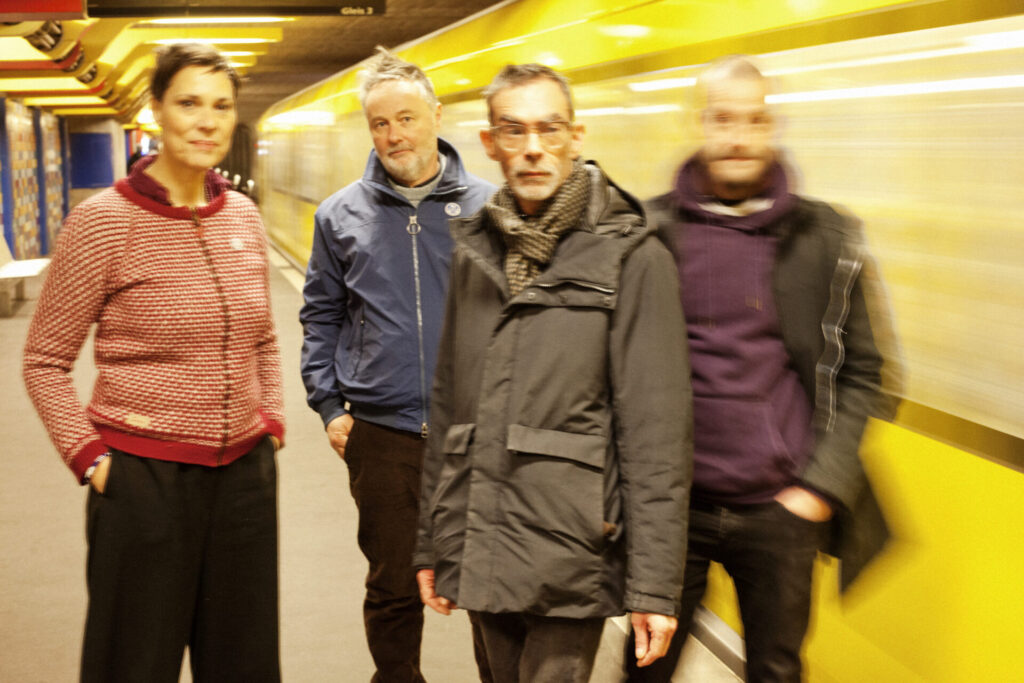Stereolab fans have expressed concerns in recent weeks that the Groop appear to be using AI to create the music video for the album’s single ‘Aerial Troubles’. Some viewers suggest it goes against the band’s progressive stance – estimates suggest that ChatGPT uses enough energy per day to charge eight million phones, or to run the Empire State Building for 540 days. Others insist that the video is meant to look like it was created with AI, but actually isn’t. One message is now extremely clear: we don’t know Stereolab as well as we think.
As a youth, Tim Gane claims he went from “Elvis Costello and the Buzzcocks to Throbbing Gristle and Cabaret Voltaire” in a matter of only 18 months. In an interview with Synth History, he confirms that PIL’s Metal Box, This Heat by This Heat and The Fall’s Dragnet were also played regularly during these formative years. For listeners who know Stereolab’s palette as being mostly inspired by lounge, muzak or niche European noise records (made notorious by that Adam and Joe ‘Vinyl Justice’ sketch), it might come as some surprise to read that Gane’s early listening habits were characterised by punk and its predecessors. It’s these influences which are so much more apparent on Instant Holograms on Metal Film.
In recent years, Stereolab have become more of a household name, often quoted as an influence on bands like Vanishing Twin or The Orielles. But in a way that feels almost playfully in spite of this cosy familiarity, Instant Holograms on Metal Film explores textures and melodies inspired by disco, techno, and lo-fi electronic music from the 1970s and 80s. Don’t get me wrong, Instant Holograms on Metal Film preserves much of the classic Stereolab sound. Its tracks retain that motorik, locked-in feel, but their palette is so much more rhythmically dense, adventurous and even cinematic. This is thanks to the band’s collaboration with Cooper Crain and Rob Frye of Bitchin’ Bajas, whose own sonic explorations feel like the perfect compliment.
Let’s start with its themes and Sadier’s voice, upon which Stereolab’s music hangs. Her stoic vocals have always felt reassuring, like she was delivering snippets of abstract, yet bittersweet messages of the state of capitalism, or alienation from one’s labour. On Instant Holograms on Metal Film, her voice is richer than ever, with a roughness or warm earthiness to it, a timbre she previously explored in collaborations with Atlas Sound and solo projects. Singing about “higher frequencies” on ‘Transmuted Matter’, Sadier makes reference instead to the spiritual and psychological effects of her heavenly vocals on the listener as she reaches the higher limits of her vocal range.
Making the album’s sentiment even more intriguing, the song’s lyrics “holy human fully divine, fully entwined” are an almost direct nod to Jesus’s simultaneous divinity and humanity. For a band that some love to label as Marxist, this is a far cry from materialism. In a recent Tone Glow interview, Sadier talks about viewing things through a “spiritual prism… you have a path… this journey and you’re here to learn”. She also explains the contradiction between her ultra-conservative Catholic upbringing and Jesus’s message of love, and the ability to develop a positive idea of her own femininity. With politics and faith being more closely linked on the global stage than ever, it makes sense for Sadier to return to faith and spirituality as a point of questioning.
Spiritual elation comes through in the album’s expansive, searching quality. It’s cinematic, too, perhaps because of Gane’s recent work on soundtracks such as for In Fabric (with his other project Cavern of Anti-Matter). Its playful transitions sound like they’re flitting between contrasting scenes, and the stereo image is filled with wonderfully surprising ideas.
While Stereolab’s signature use of repetition remains strong, here they subtly tweak effects or bring in new elements to cleverly insert novelty in a way that means it never sours. And the way they do this absolutely grooves, thanks to the combination of loose instrumentation and tight, fixed rhythms. A great example of this is ‘Electrified Teenybop!’, introduced by a frantic synth arp sputtering in and out of the picture. The track’s harshness means it wouldn’t sound too out of place on Transient Random-Noise Bursts With Announcements. High drama two-note riffs reveal Gane’s Buzzcocks influences further, and there’s a smidge of early Ultravox in its trashy melding of synth and phased guitar strums.
One of the biggest surprises here are the tracks that wouldn’t be out of place in a club setting, or at least in sample-form. ‘Immortal Hands’ morphs into a more disco friendly form around the halfway mark, complete with flanged riffs and twinkling piano. The shape has a staccato-y severity though, continuing the compromise between the Stereolab of yesteryear and this new territory. There’s a pure art-rock ‘Once in a Lifetime’-esque lift towards the end of the track, but – tantalisingly – they pull you away from it, back into a less expressive, more refined lounge groove. All these transitions feel remarkably seamless and feel more like patterns in a fabric woven together than individual tracks. For all of its raw edges, the finished product feels remarkably coherent.
The band’s indefinite hiatus has not been in vain, as they have clearly been spending this time carefully piecing together what feels like their strongest album in years. Instant Holograms on Metal Film also feels particularly emotionally resonant. While their previous release Not Music still had Stereolab’s wonderful melodic sensibilities, its production was considerably more claustrophobic, distracted and distant compared to the openness we find on their latest. Maybe this is something to do with Stereolab finding perfect collaborators (as they did with Nurse With Wound on Simple Headphone Mind). With Bitchin’ Bajas members too, it sounds like they’re relaxed and open to exploration, making for a suite of songs as bright as its yolk-yellow album art.


